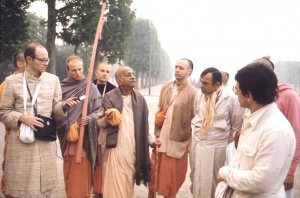CC Antya 1.146 (1975): Difference between revisions
(Vanibot #0027: CCMirror - Mirror CC's 1996 edition to form a basis for 1975) |
(Vanibot #0020: VersionCompareLinker - added a link to the Version Compare feature) |
||
| Line 2: | Line 2: | ||
<div style="float:left">'''[[Sri Caitanya-caritamrta (1975)|Śrī Caitanya-caritāmṛta (1975)]] - [[CC Antya (1975)|Antya-līlā]] - [[CC Antya 1 (1975)|Chapter 1: Śrīla Rūpa Gosvāmī's Second Meeting With the Lord]]'''</div> | <div style="float:left">'''[[Sri Caitanya-caritamrta (1975)|Śrī Caitanya-caritāmṛta (1975)]] - [[CC Antya (1975)|Antya-līlā]] - [[CC Antya 1 (1975)|Chapter 1: Śrīla Rūpa Gosvāmī's Second Meeting With the Lord]]'''</div> | ||
<div style="float:right">[[File:Go-previous.png|link=CC Antya 1.145 (1975)|Antya-līlā 1.145]] '''[[CC Antya 1.145 (1975)|Antya-līlā 1.145]] - [[CC Antya 1.147 (1975)|Antya-līlā 1.147]]''' [[File:Go-next.png|link=CC Antya 1.147 (1975)|Antya-līlā 1.147]]</div> | <div style="float:right">[[File:Go-previous.png|link=CC Antya 1.145 (1975)|Antya-līlā 1.145]] '''[[CC Antya 1.145 (1975)|Antya-līlā 1.145]] - [[CC Antya 1.147 (1975)|Antya-līlā 1.147]]''' [[File:Go-next.png|link=CC Antya 1.147 (1975)|Antya-līlā 1.147]]</div> | ||
{{CompareVersions|CC|Antya 1.146|CC 1975|CC 1996}} | |||
{{RandomImage}} | {{RandomImage}} | ||
==== TEXT 146 ==== | ==== TEXT 146 ==== | ||
| Line 20: | Line 19: | ||
<div class="synonyms"> | <div class="synonyms"> | ||
akāruṇyaḥ—very cruel; kṛṣṇaḥ—Lord Kṛṣṇa; yadi—if; mayi—unto Me; tava—your; āgaḥ—offense; katham—how; idam—this; mudhā—uselessly; mā rodīḥ—do not cry; me-for Me; kuru—do; param—but afterwards; imām—this; uttara-kṛtim—final act; tamālasya—of a tamāla tree; skandhe—the trunk; vinihita—fixed upon; bhuja-vallariḥ—arms like creepers; iyam—this; yathā—as far as possible; vṛndā-araṇye—in the forest of Vṛndāvana; ciram—forever; avicalā—without being disturbed; tiṣṭhati—remains; tanuḥ—the body. | |||
</div> | </div> | ||
| Line 27: | Line 26: | ||
<div class="translation"> | <div class="translation"> | ||
Śrīmatī Rādhārāṇī said to Her constant companion Viśākhā: "My dear friend, if Kṛṣṇa is unkind to Me, there will be no need for you to cry, for it wiIl not be due to any fault of yours. I shall then have to die, but afterwards please do one thing for Me: to observe My funeral ceremony, place My body with its arms embracing a tamāla tree like creepers so that I may remain forever in Vṛndāvana undisturbed. That is My last request."(Vidagdha-mādhava 2.47) | |||
</div> | </div> | ||
| Line 34: | Line 33: | ||
<div class="purport"> | <div class="purport"> | ||
</div> | </div> | ||
Latest revision as of 20:09, 26 January 2020

A.C. Bhaktivedanta Swami Prabhupada
TEXT 146
- akāruṇyaḥ kṛṣṇo yadi mayi tavāgaḥ katham idaṁ
- mudhā mā rodīr me kuru param imām uttara-kṛtim
- tamālasya skandhe vinihita-bhuja-vallarir iyaṁ
- yathā vṛndāraṇye ciram avicalā tiṣṭhati tanuḥ
SYNONYMS
akāruṇyaḥ—very cruel; kṛṣṇaḥ—Lord Kṛṣṇa; yadi—if; mayi—unto Me; tava—your; āgaḥ—offense; katham—how; idam—this; mudhā—uselessly; mā rodīḥ—do not cry; me-for Me; kuru—do; param—but afterwards; imām—this; uttara-kṛtim—final act; tamālasya—of a tamāla tree; skandhe—the trunk; vinihita—fixed upon; bhuja-vallariḥ—arms like creepers; iyam—this; yathā—as far as possible; vṛndā-araṇye—in the forest of Vṛndāvana; ciram—forever; avicalā—without being disturbed; tiṣṭhati—remains; tanuḥ—the body.
TRANSLATION
Śrīmatī Rādhārāṇī said to Her constant companion Viśākhā: "My dear friend, if Kṛṣṇa is unkind to Me, there will be no need for you to cry, for it wiIl not be due to any fault of yours. I shall then have to die, but afterwards please do one thing for Me: to observe My funeral ceremony, place My body with its arms embracing a tamāla tree like creepers so that I may remain forever in Vṛndāvana undisturbed. That is My last request."(Vidagdha-mādhava 2.47)
PURPORT